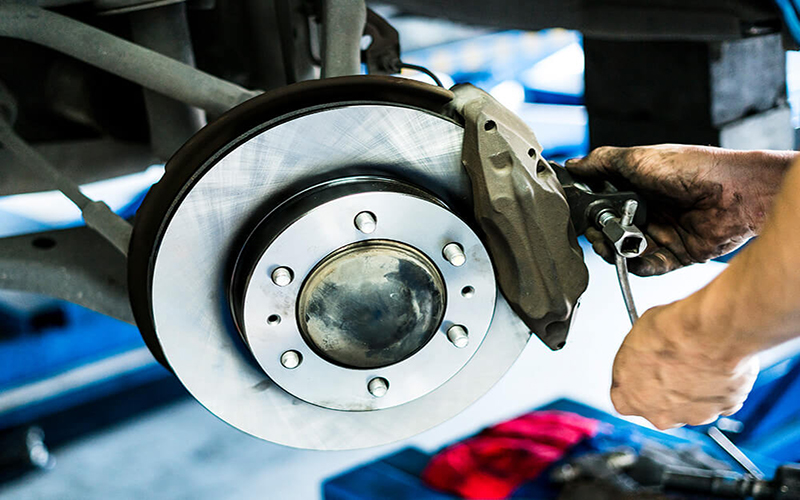When it comes to maintaining automobiles, there are important parts, and there are crucial parts. Brake pads are among the most crucial of the crucial components that are considered normal wear items, since they create the friction that helps stop your car when they are pressed against the brake disc (also called the brake rotor) or, on some cars, the brake drum that rotates with the wheel. It is in every driver’s interest—not to mention the interests of their passengers and fellow motorists—that their brake pads always function properly and that they are replaced before they lose effectiveness. But when should you replace the pads?
Wear Out
Whether the brake pads on your vehicle are made of metallic, organic, ceramic, or composite materials, they lose a minute amount of material each time they are used. Eventually, they wear thin, which means they can’t generate the heat caused by friction as effectively, decreasing their ability to stop the vehicle quickly and potentially increasing the distances required to do so. Ultimately, they wear out completely, which can cause a host of issues.
If you are noticing that your brakes aren’t as responsive as they once were or that they fade quickly or that the pedal feels different after you’ve been driving in traffic for a while or down a long mountain pass, it could be time for new brake pads. But sometimes in normal driving, brakes will feel fine until something else tells you they need replacement.
Brake-Wear Warning Signs
Some cars have brake-pad sensors that inform the driver of worn brake pads via a light in the dashboard or a message shown upon startup. Some brake systems call attention to themselves by squeaking or screeching when they get too thin; while unpleasant, this is usually harmless. It’s caused by a metal scraper attached to the pads that serve as a warning alarm. If the noise is less of a screech and more of a grumbling, grinding sound, the pads at one or all of the wheels may be gone altogether, and further use of the brakes can cause serious damage to the rotors. This is not a sound you want to hear, and if you do you must take your vehicle to a brake shop immediately. Better still, you want to replace the pads before you ever hear such warnings.
With car maintenance, there are important parts and crucial parts. Brake pads are crucial parts.
What we don’t recommend is waiting to replace the brake pads for weeks or months after the first warning signs emerge, or considering properly functioning brakes anything less than a top priority. From a safety standpoint, they are more important than the engine. After all, a poorly maintained engine could result in engine failure. But if your poorly maintained brakes take longer to stop than they should or, worse, fail, the result could be life-threatening.
Pay attention to the condition of your brakes now and you’ll avoid big repair bills—or an accident—later. If you’re feeling ambitious and want to replace your vehicle’s brake pads yourself, you’ll also need to bleed the brake system afterward.














[…] of traction your vehicle has when the roads are wet. Look for signs of damage on the sides of the tire, then use the “Coin test” to see if there’s enough tread on the […]
[…] Sputters at High […]
[…] an RPM of 2000-2500 for heavy cutting with wool pads and 1600-1800 for light cutting. For foam pads, use 1100-1300 […]
[…] the product’s label says that it can be used on windshields and other glass surfaces of your car, then it should be safe to use. If not, you will definitely have to look for a product that is more […]
[…] viruses are a type of virus. There are many different kinds, and some cause disease. A newly identified type has caused a recent […]
[…] content of the grease. Greases that are used in marine environments need to be very water-resistant. This allows them to protect metal parts from becoming corroded and so they last longer. Saltwater […]
[…] fuel injectors, and you’ll upkeep optimal performance. As such a vital component to your engine, you need to know every possible issue that can pop up, and how to properly clean them to ensure […]
[…] But especially for new parents who are putting a car seat and a trunk that can fit a stroller, these concerns are really significant and at times is the decision making factors. A car is a […]
[…] Alert At All Times So don’t forget some of the basics of your road safety training. Remember to watch out for lights as well as movement and don’t forget to keep looking […]
[…] There is another issue inherent to independent or beam axle systems. This design can greatly contribute to an increase in unsprung weight or weight that simply is not supported by the suspension parts of your car. Technically, this includes the mass of the wheel axles, tires, wheel hubs, and other components that are not supported by the car’s suspension. High unsprung weight can amplify vibrations or bumps felt on the road since these forces that are supposed to be absorbed by the tires are generally transmitted into the beam suspension parts. This, in turn, creates movement in the parts since there is a significantly greater mass in beam axles than in independent suspension systems. Additionally, high unsprung weight can also lead to issues of wheel control especially during hard acceleration or even braking. […]
[…] that are mounted onto the wheels. Technically, your tyres are what connect your car to the ground. Such is the importance of tyres that we’ve prepared this ultimate guide to help you better […]
[…] Braking System (ABS) is used in advanced automobiles to prevent slip and locking of the wheel after brakes applied. It is an automobile safety system, the controller is provided to control the necessary […]
[…] Best Shock Absorbers, Whatever your vehicle, lifestyle, or budget, we’re confident there’s something on our list to meet your needs. To help you find the perfect shocks for you – and get the most out of them – we’ve put together this brief guide. Below, we run through how to spot a quality shock absorber, the different types available, and how to tell if yours should be replaced. […]
[…] drag and rolling resistance by dropping speed in the process. It can be used smartly instead of braking at times. When you can see a red light from a distance or slow-moving traffic in front of you, and […]
[…] Braking System (ABS) is used in advanced automobiles to prevent slip and locking of the wheel after brakes applied. It is an automobile safety system, the controller is provided to control the necessary […]
[…] Elegance On The Move Get behind the wheel of a world of elegance. In comes Sportage, a splash of style, a dash of class, and an epitome of superior performance and elegance. […]
[…] are numerous reasons why your car could be giving off smoke. Some of the most common causes […]
[…] in the tray designed for the battery. This means having the right length, width, and height and the right terminal locations. You can consult your owner’s manual or mechanic if you’re unsure about […]
[…] There are two fundamental types of synthetic oil currently available in the market. Choosing which between these two will be right for your vehicle depends on a variety of factors that we will be looking into in greater detail in the next section. Suffice it to say, it is best to understand the 2 types of synthetic oil first. […]
[…] and aftermarket parts may look similar but often come in different dimensions, specifications, and tensile strength from […]
[…] Without coolants, it would be quite difficult to prevent an engine from freezing or overheating. This automotive fluid is critical to the optimum operation of your car’s engine. Using the right […]
[…] the car door and a sudden blow of nuke-heat is all onto you after you parked your car under the sun. Feels as if the sun was itself in the car and might melt you away with it. It could be tricky to […]
[…] bars to forged, cast, or stamped metal shapes that best fit to support the springs, shocks, and wheels onto vehicle frames or body structures. The simplest linkage is a straight bar that connects […]